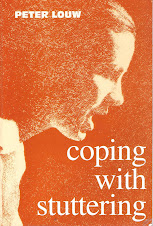This diagram shows my current tentative thinking about stuttering ... the icon for the "mindbody" (psycho-physical) component is larger because it seems to play a more prominent part than the other "day-to-day" non-mindbody stresses that also impact on fluency.
Stuttering can be tackled at any of these three levels: at the top, the mindbody issues such as repressed emotions (fear, rage etc.); in the middle, the tensions generated by either the mindbody or by other, non-mindbody stresses; and at the bottom, the tension-related vocal-cord "freezing" or "locking" that results in conditioned repetitions, prolongations, secondary behaviours such as stamping a foot etc.
Of course, if mindbody issues are regarded as the actual cause of stuttering, and treated by way of mindbody healing, it would theoretically not be necessary to reduce tension (at the middle level) or work on preventing the vocal-cord blocks (at the bottom level). In real life, however, stress management and some way of dealing with the vocal-cord blocks would support mindbody healing. For instance, relapses at the upper level of the mindbody would be counteracted by stress management at the middle level. And fluency techniques such as Passive Airflow, Slow / Easy Onset, breathing techniques etc. would still have a purpose to reduce vocal-cord tension at the bottom level.
Feel free to join my "Stuttering as a mindbody disorder" Facebook group !







I have been stuttering from last 26 years. I always avoided situation where I had to speak to a stranger or group of people.
ReplyDeleteI kind of ignored my stutter until recently.
Recently my 4 years old daughter started to stuttered. I felt devastated. I blamed myself for that. She might have noticed me stuttering and picked that up.
I was very angry and took a vow to throw the Stutter out of my life.
I did relentless research on Stuttering for 4 months continuously.
I checked many articles, forums, checked advice from speech therapist etc and was finally able to Find a Pattern which most of the stutterers suffer from.
I deviced a technique to fight that Pattern and in no time completely recovered from the curse of stuttering.
I have compiled my findings and techniques in the Free App below.
I strongly believe by following the same, you would also be able to throw the stutter out of your life.
All the best.
https://play.google.com/store/apps/details?id=com.kaushikbaruah.stutter
I have a suggestion. I feel like there's a possibility that stutterers might have vocal cord paresis or something similar, since stuttering is the result of the locking of the vocal cords. In vocal cord paresis or paralysis, nerve connections are disturbed and don't reach their target, the brain, easily. Maybe that's the same situation in stuttering. Off topic, the question of whether stuttering onset happens on its own, or if emotions trigger it, is kind of like whether the chicken or the egg came first, I think that physical stuttering happens first(egg) and a possible explanation for it would be vocal cord paresis. A source I read somewhere else said that 2% of people focus most of their tension on the vocal cords, and maybe the tension causes a malfunction in the nerves, and communication is disrupted, leading to repeated nerve impulses and the locking and unlocking of vocal cords, and stuttering. I'm not a speech pathologist or some sort of doctor, I'm not even an adult yet(I'm 13), this is just my opinion.
ReplyDeleteHi Said - For a 13-year-old you think and write very well! I hope that you will join my "Stuttering as a mindbody disorder" Facebook group because we need sharp thinkers such as yourself! Regarding vocal cord paralysis or paresis (VCP) - I don't think that stuttering is caused by VCP as VCP is something quite different. People with VCP tend to have a rough, hoarse voice. It is caused by damage to a nerve(s) of the vocal cords. If there is nerve damage, the vocal cords will not be able to come together sufficiently and result in phonation. As a result, the voice will be breathy or rough. People who stutter, however, do not have a rough or otherwise unnatural voice. Their vocal cords seem to "freeze" momentarily and as a result they stutter when they try to speak, but their voice quality itself, when they do manage to speak, is normal. Their vocal cords are able to come together, but apparently due to some type of tension they suddenly "lock", causing problems when trying to pronounce words. You can google VCP for more information.
DeleteSo I don't think that VCP is involved here; but you also write "or something similar" - and yes, you can google "laryngospasm" as another laryngeal disorder which could perhaps result in stuttering. In fact, Dr Martin Schwartz postulated long ago that laryngospasm was actually what resulted in stuttering. I would not be surprised if in fact that is what is happening when we stutter. But then I'm not a laryngologist.
In my view the metaphor of the chicken and the egg is not applicable to the emotions-stuttering relationship. The emotions-stuttering relationship is a cause-and-effect relationship while the chicken-egg is something quite else. An egg is not the "cause" of a chicken. But I agree that it could well be true that some people channel their tension to their vocal cords. In fact that's what I've been saying for decades.